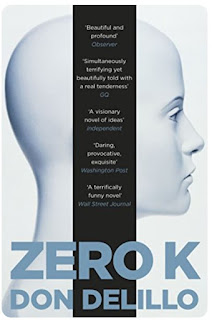Zero K
Some of my students bought me this book, knowing that I am a fan of Don Delillo, having heard me talk about End Zone and White Noise (see earlier reviews). Like these earlier novels, Zero K is set in end-times for the human race (while the race continues on as ever). Not nuclear catastrophe, however, but an overreliance on technology, growing autocracy, and climate change as background. The immediate story is how to escape via a fairly extreme version of the underground bunker. By choosing the time of their suspension via cryogenics, the ultra-rich hope to weather the storm of the coming apocalypse and wake to a better world. This all seems like madness to the storyteller, Jeffrey, whose step-mother Artis and billionaire father Ross Lockhart seek to take this bizarre leap of faith (involving, as it does, the preservation of the body and brain as separate commodities). The first line of the novel sets the theme in motion: “Everybody wants to own the end of the world” (p.3).
The story begins in Chelyabinsk, somewhere out of sight in this
Russian province, in a state-of-the-art facility built as both hotel for those
waiting their ‘journey’, and as the storage facility for their bodies once ‘checked
in’. It a claustrophobic. Ross tells Jeffrey, “Respect the setting itself.
Artis says we ought to regard it as a work-in-progress, an earthwork, a form of
earth art, land art”. What Jeffrey reports is a series of empty halls, with
even-spaced doors (closed) and – at the end of the last hall – a screen “jutting
from a niche in the ceiling”. This screen is something like the inverse of the
Telescreen in 1984 but it has a
similarly oppressive effect: Jeffrey watches images of death, without sound. In
the first example, a house collapses in a mudslide and a man “underwater, [stares]
out at me” (pp.10-11). In another scene, Jeffrey is overwhelmed by images of
people running, “trying to escape some dreadful spectacle or rumbling threat”
(p.152). The images of apocalyptic scenes seem, indeed, rather prescient. For
example, the Australian fires of 2019 might reflect the image of “a single
figure walking through a town’s empty streets with homes imploded by heat and
flame and lawn ornaments shrivelled to a crisp” ([p.120] – the novel was
published in 2016). Even more interesting is this COVID-19-like
description:
“Elsewhere now people wearing facemasks, hundreds moving at
camera level, walking or being carried by others, and was this a disease, a
virus, long ranks of slow-moving men and women, and is it something spread by
insects or vermin and carried on airborne dust, dead-eyed individuals, in the
thousands now, walking a stricken pace that resembled forever” (p.12).
The sense of impending doom is the logic behind the step
into suspension. In the case of his stepmother, Artis has terminal cancer and
wishes to beat that; as a healthy billionaire his father is another matter and Ross's contemplation of the cryogenic state creates the more disturbing
existential threads of the novel. There is logic to getting ahead of the chaos
of collapse, as one of the ‘founding fathers’ explains to Jeffrey: “He spoke in
detail about food systems, weather systems, the loss of forests, the spread of
drought, the massive die-offs of birds and ocean life, the levels of carbon
dioxide, the waves of virus that envelop broad geographies” (127). More
disturbing that this list of current and future threats is the interlude
entitled “Artis Martineau” in the middle of the book (between Parts 1 and 2)
which imagines Artis’s consciousness in her state of suspended animation. This
six-page monologue is hard to capture in a short quotation as it builds through repetition to
suggest an algorithmic disturbance of the mind, but here is the start at least:
But am I who I was.
I think I am someone. There is someone here and I feel it is me or with me.
But where is here and how long am I here and am I only what is here.
As in his other novels, Don Delillo’s fiction disturbs in
that it dramatises the fears of the age. In End Game, it was the terrifying logic of Mutually Assured
Destruction (it was the 1970s); here the sense of doom for humanity gathers
pace in that it is more climatic, but also digital. The
suspended Artis is an extension of the current human condition, as another Zero
K official argues: “Do you ever feel unfleshed? All the coded impulses you
depend on to guide you. All the sensors in the room that are watching you, listening
to you, tracking your habits, measuring your capabilities. All the linked data
designed to incorporate you into the megadata.” The questions that follow this
statement link the global and the personal, and summarise the unease that the
novel manages effortlessly to conjure: “Is there something that makes you
uneasy? Do you think about the technovirus, all systems down, global implosion?
Or is it more personal? Do you feel steeped in some horrific digital panic that’s
everywhere and nowhere?” (p.239).
Yes, yes,
yes and yes. But no trip to Russia for protagonist Jeffrey -- or this reader Geoffrey. Just a determination to stick it out in the blind hope that in time we might view the novel as darkly
comic, as we read End Zone today, now
that MAD is not the thing that keeps us awake at night.




Comments
Post a Comment